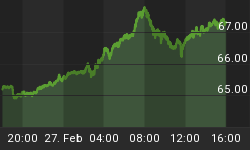The world is evolving a lot faster than I suspect most realize. The Fed has created the aura of a V shaped global recovery in the form of continually rising equity markets. Bernanke has created the mirage of prosperity. The unemployment rate has fallen below 9% as more disgruntled workers leave the work force. Paper stock wealth is up nearly 100% in two years. Indeed the Russell 2000 is up 43% since QE2 as the chairman has so eloquently declared.
The similarities between 2008 and today are very real with a few exceptions. In 2008 the US Treasury market was far healthier, government austerity was a few years down the road and there was no global revolution. In reality 2011 is far more dangerous than 2008. Government is no longer a source of stimulus. The measly $38.5 billion, or 2% of the 2011 deficit that was cut is a negative stimulus. $110 oil today is driven by speculators as in 2008 but also by wars in the Middle East. That was not the case in 2008 (Iraq oil was flowing freely). In 2008 interest rates were falling as the Fed lowered short terms rates very aggressively. Today they are rising.
In 2008 housing prices were still falling but programs like tax credits and HAMP where there to stem the slide. Today home prices are falling again yet those programs are no longer available. Today, a true free market is the only source of price discovery aided by dwindling bank credit. FASB accounting prevented a major run on bank balance sheet capital levels in the spring of 2009. Today there are few if any accounting games left.
The bond market is teetering on a new bear market causing a potential spike in rates across the entire yield curve. With a $15 trillion national debt, a 100 basis point rise in yields would cost the Federal government an additional $150 billion annually. That's 4 times the amount "cut" this past week to avert a government shutdown. Imagine rates going back to more historic levels. Imagine rates truly pricing in not only inflation but the probability of default. Can the US handle a 200 basis point rise or $300 billion in additional debt payments? Did you know we roll our debt every four years. $15 trillion every four years. An astonishing and scary fact.
The third largest economy is off line. Market "pros" will argue the damage is minimal and government stimulus is actually a net positive for the global economy. Did they factor in the reality of Japanese exports being halted in countries like India due to radiation fears? Did they factor in the disruption of industries like fishing in Japan as millions of gallons of radioactive water are dumped into the ocean. Did they factor in the emotional impact on Japanese citizens and the resulting impact on spending habits? Did they factor in the 20% electrical grid being removed and rolling blackouts facing the country?
The eurozone is yet another issue that is evolving quickly. After months of saying they needed no help, Portugal finally admitted the truth. What's scary is Spain just came out and said they require no help. Ireland and Greece did a similar PR stunt before requesting a bailout. Iceland is showing the world how defaulting on debt and starting anew is a great way to jump start an economy. Bankruptcy is part of a healthy economy. It was written into the US constitution. Resetting the system is no different than a forest fire where waste is removed and new, prosperous growth begins. French and German banks alone have nearly 1 trillion exposure to Ireland, Portugal, Greece and Spain. This is not a PIIGS problem.
History may show that Friday April 8 was truly a watershed moment in the global economy. Facing a government shutdown, US leaders failed the world again. They bickered over pennies, in fact 2 cents on a $1 deficit. What they failed to understand is their inaction was the impetus for a key selloff in the US dollar and breakout in precious metals. The new global currency has begun to change hands. As the US dollar fades, prices and rates will rise. This was not a headwind in 2008 but it is in 2011.
The market can rise another 20-30% or more. To think it will rise indefinitely is a dangerous game. Now is the time to begin planning for the future. If you missed the 2008 crash and were forced to watch your hard earned dollars disappear, 2011 presents an opportunity to reverse that balance sheet transfer. The time to become more diligent is upon us I truly believe. This is not fear mongering. This is not uber bear blogging. This is the reality of looking at the world we live in. The reality of watching events unfold, new headwinds formed and a system that never truly confronted the issues it faced in 2008.
Ignoring the past is not a solution for the future.















